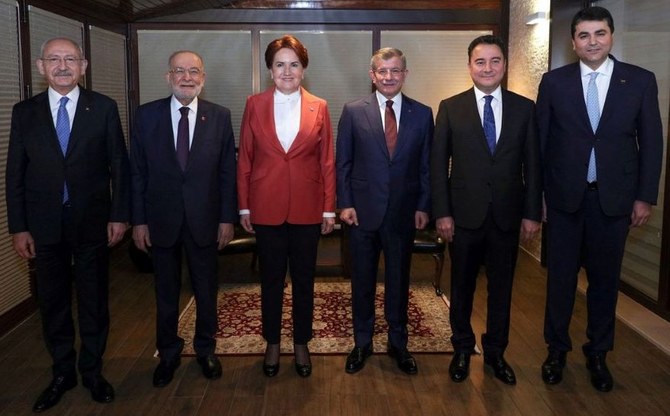Turkiye’s major opposition parties agree reform framework

https://arab.news/ck5tq
Six relatively important Turkish opposition parties were gathering around a table that used to be called the “table for six.” The steering powers of this table were Kemal Kilicdaroglu, the leader of the main opposition Republican People’s Party, and Meral Aksener, the leader of the Good Party who has previously served as interior minister. Aksener has nationalistic roots from her youth, while her husband was a dedicated leftist.
There are four more parties, but their public support remains insignificant. One of them, the Future Party, is led by former Prime Minister Ahmet Davutoglu, but it has no seat in the national parliament or the 30 major municipalities. Another is the Democracy and Progress Party led by Ali Babacan, who was the architect of Turkiye’s brilliant economic performance in the early years of the ruling Justice and Development Party. The remaining two parties have neither a strong power base nor an outstanding leadership.
The performance of the so-called table for six has remained modest so far and it has been subjected to criticism because the parties have failed to deliver anything concrete.
Last week, they unveiled a document determining the broad lines of what they plan to achieve in case they come to power. The main title of their plan is the “Strengthened Parliamentary System.” It mainly aims to reverse President Recep Tayyip Erdogan’s arbitrary method of governance. It is inspired by the American system, but without the main characteristic of the US system, which is its checks and balances. In Turkiye, the judiciary is under the strict control of the president and the parliament is nothing but a tool that he uses to give the impression that democracy is functioning in the country.
The table of six’s efforts are more focused on undoing the effects of the presidential system that was adopted after a referendum that took place in 2017. The strengthened parliamentary system also aims at undoing the antidemocratic practices that the military junta introduced in 1980. Politicians naturally focus their attention on the most burning issue, which is democracy, whereas there is nothing wrong in the system. The problem lies in the discrepancies in the implementation of democracy. Therefore, there is little hope that things will improve if the top decision-maker arbitrarily uses their political judgment.
Turkiye may be ahead of many countries in its region in terms of democratic practices, but it is still behind schedule compared to the Western democracies. Whether or not the present efforts will help improve its record will depend on how successive rulers will use their judgment. A country will not automatically become democratic as soon a set of democratic rules are introduced. The intentions may be good, but the fractured nature of the opposition parties in the table of six does not guarantee that a fully democratic Turkiye is just around the corner.
There are varying opinions about the role of the Peoples’ Democracy Party. One of the major actors around the table, namely Aksener, has already declared her reluctance to cooperate with the pro-Kurdish party. However, there are about 15 million Kurds in Turkiye. Of course, not all Kurds vote for the pro-Kurdish parties. There are Cabinet ministers of Kurdish origin in the government. There have always been Kurds voting for non-Kurdish parties. This is what is going to happen in the forthcoming elections as well. But this does not change the reality that the Kurds are an important component of the Turkish electorate and, generally, Kurds are one of the most dedicated blocs of voters in Turkiye.
To ignore such an important bloc on the threshold of critical elections is nothing but an improperly designed attitude. Especially in the deeply fractured political environment of the Turkish electorate, Kurds will emerge as the kingmakers. Though she is a pragmatic politician, Aksener should not have unnecessarily laid her cards on the table before the elections. She did not need to make a statement of that sort.
There is little hope that things will improve if the top decision-maker arbitrarily uses their political judgment.
Yasar Yakis
Supposing that the elections are won by the opposition bloc, it is neither realistic nor fair to exclude the pro-Kurdish party from the future government. The government may not obtain the required vote of confidence without the backing of the Kurdish-origin members of parliament.
Coming up with a structured text for the reforms before the crucial elections is an important step. However, changing allegiance is a common practice ahead of the vote. The race among the rank-and-file members of the parties has already started. There may be disillusioned members of the opposition parties that will join the ruling party if they see a brighter future there.
So, agreeing on a common text for the reforms to be carried out is definitely a concrete step, but it does not guarantee that the elections will be won by the opposition parties.
- Yasar Yakis is a former foreign minister of Turkiye and founding member of the ruling AK Party. Twitter: @yakis_yasar










































